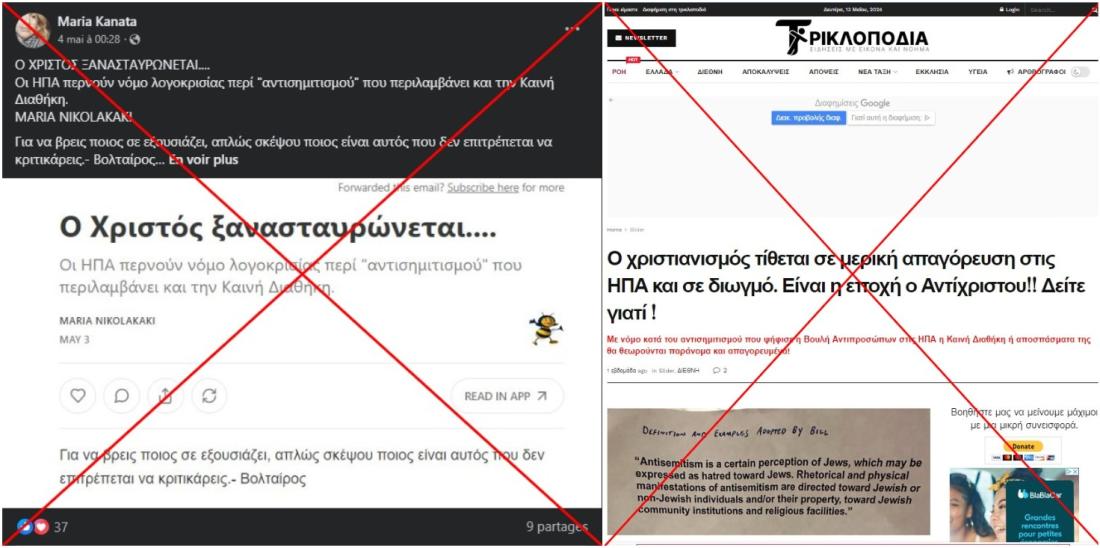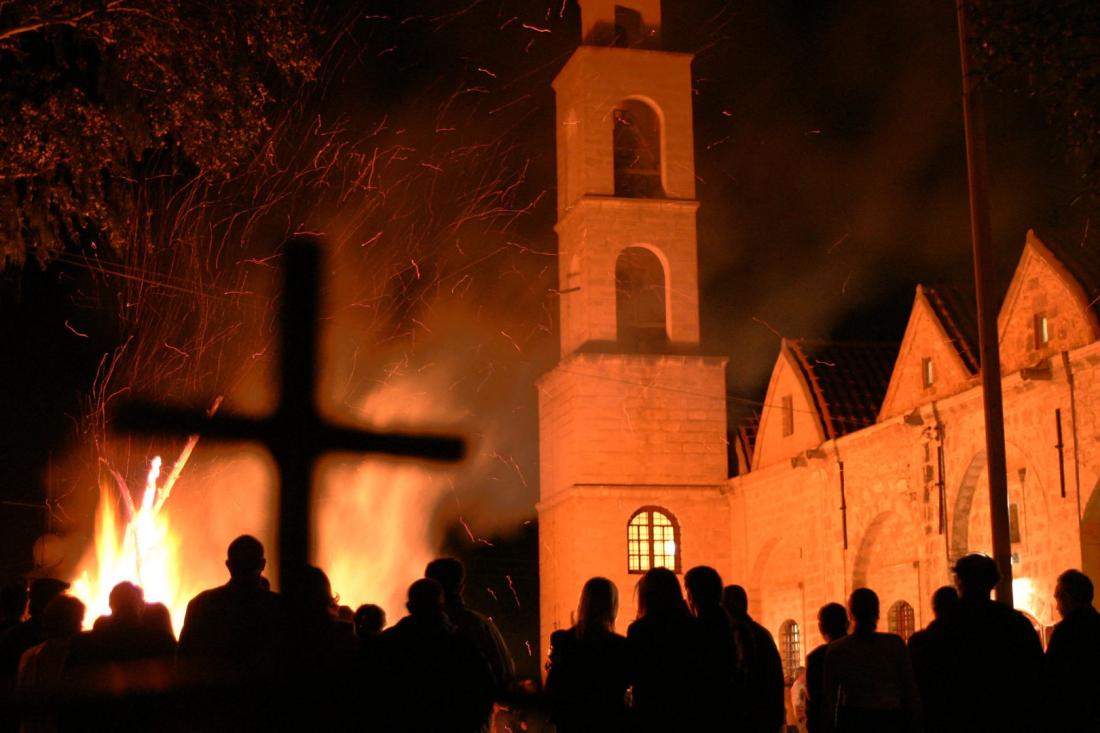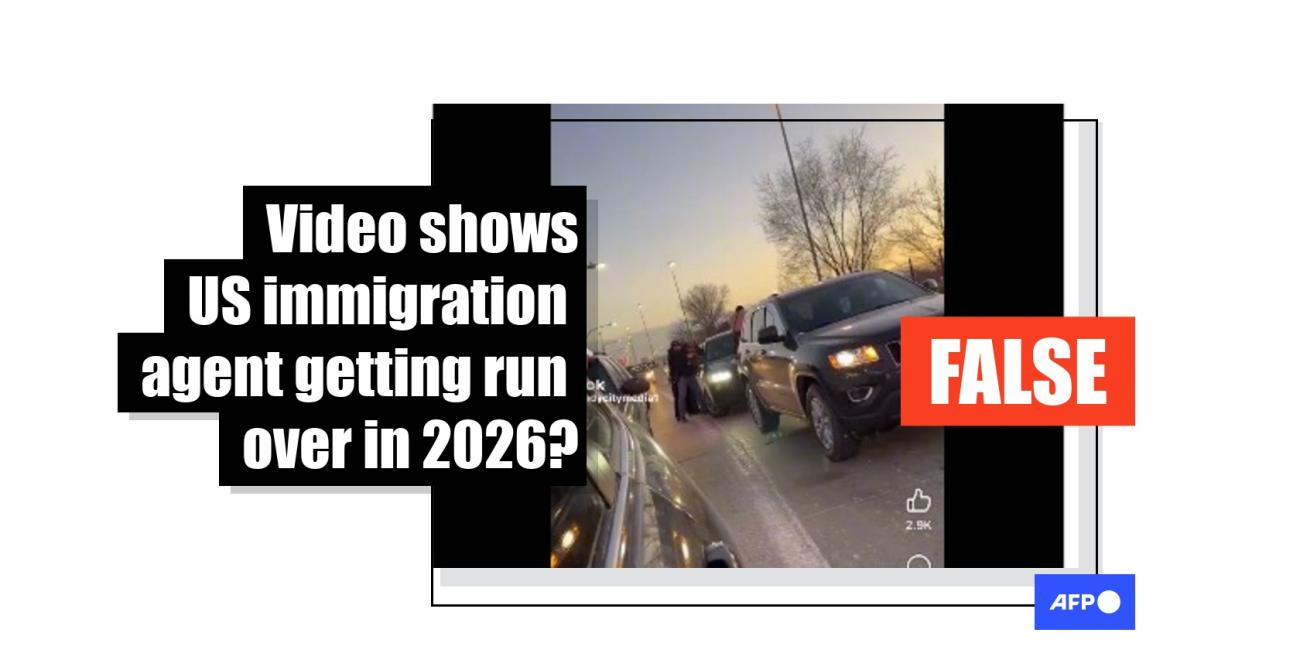
US anti-Semitism bill misrepresented online
- This article is more than one year old.
- Published on May 17, 2024 at 18:07
- 5 min read
- By Daniel FUNKE, Théophile BLOUDANIS, AFP USA, AFP Greece
The Anti-Semitism Awareness Act (archived here), which has been sent to the Senate for consideration, expands the legal definition of anti-Semitism.
The bill was passed as pro-Palestinian protests rocked university campuses across the US linked to Israel's military assault on Gaza following Hamas's unprecedented attack on October 7. The unrest has posed a challenge to US university administrators trying to balance free speech rights with complaints that the rallies have veered into anti-Semitism.
"CHRIST IS CRUCIFIED AGAIN.... The US passes an 'anti-Semitism' censorship law that includes the New Testament," reads a Greek Facebook post from May 9, 2024. It shares an image of a blog post with a false claim that the bill bans quoting the Bible.
Other Facebook posts in Greek mention a list of examples of anti-Semitism referred to in the bill, as do online articles such as here and here.
These same claims were also circulated widely in English including by controversial influencer Andrew Tate, who wrote: "Theyve banned the bible in a 'Christian' nation."
Some articles in Greek display US Congresswoman Marjorie Taylor Greene's May 1, 2024 post on X which reads: "Antisemitism is wrong, but I will not be voting for the Antisemitism Awareness Act of 2023 (H.R. 6090) today that could convict Christians of antisemitism for believing the Gospel that says Jesus was handed over to Herod to be crucified by the Jews."
However, the main sponsors of the bill reject claims that the legislation would criminalise the Bible. Furthermore, these claims are based on the myth that Jews are collectively responsible for the crucifixion of Christ.

Examples of antisemitism considered, not the Bible
The Anti-Semitism Awareness Act requires the US Department of Education to adopt the International Holocaust Remembrance Alliance (IHRA) working definition of anti-Semitism when tackling discrimination. That definition cites several examples of potentially hateful speech, such as using "claims of Jews killing Jesus" to "characterize Israel or Israelis" (archived here).
"To somehow use that (definition) to say that this bill now is going to prosecute Christians is absurd on its face -- it's inflammatory and it's irrational," said Republican Congressman Mike Lawler, a practising Catholic, in a May 1 interview with CNN (archived here).
"What it is saying in using that contemporary example is that these examples may be considered, but that it depends on the context of what is said. If you're calling all Jews Christ-killers, then yes, that is anti-Semitic and everybody understands that. But if you're referring to the Bible in context, then no, nobody is saying that that is anti-Semitic."
Co-sponsor Jared Moskowitz also denied Greene's claims. "I want Christians to be able to practice however Christians deem that they need to, and we're not interested in messing with the gospel nor does this language do that," the Democratic congressman told CNN.
The "deicide" myth
The notion that Jews are to blame for the crucifixion of Jesus has a long history.
"For centuries the Church taught that Jews were responsible for Jesus' death, not recognizing, as most historians do today, that Jesus was executed by the Roman government because officials viewed him as a political threat to their rule," the US Holocaust Memorial Museum says on its website (archived here).
"The myth that Jews collectively murdered Jesus, also referred to as 'deicide,' has been used to justify violence against Jews for centuries," the Anti-Defamation League (ADL) says on its website (archived here). "Historians as well as Christian leaders have agreed that the claim is baseless."
Contacted by phone by AFP on May 13, 2024, Anastasios Karababas, historian and author of the book In the Footsteps of the Jews of Greece, said "this belief is still very much part of the collective unconscious in Greece" and at the heart of a religiously justified "anti-Judaism".
"For the collective unconscious in Greece, it's the religion of the Jews that poses a problem insofar as, according to the myth of 'deicide', they crucified Jesus Christ, and this is seen in Greece but also in other Orthodox countries," he said.
However, the Roman Catholic Church officially disavowed the belief in 1965 (archived here). In a 2011 book (archived here), Pope Benedict XVI again absolved Jews of responsibility for the death of Christ, whose family and disciples were Jewish.
In Greece, the Orthodox Church has not officially made a pronouncement of this kind and, according to Karababas, some individual priests do repeat the "deicide" myth.
Karababas also pointed to the tradition of "burning Judas" during Easter, saying this figure can also be seen to represent that of the "traitorous Jew". It is a tradition also found elsewhere in Eastern Europe.
It has been the subject of debate in Greece in the past, with articles in the Greek press calling it anti-Semitic. It has also led to instances of anti-Semitism in other European countries.

"Not a new policy"
Contrary to claims online that the US Anti-Semitism Awareness Act will apply to all speech in the United States, it is focused only on the US Department of Education.
If it does become law, the act would require the Department of Education's Office for Civil Rights to use the IHRA working definition of anti-Semitism when enforcing Title VI of the Civil Rights Act.
The 1964 law "prohibits discrimination based on race, color or national origin in programs or activities that receive federal financial assistance," the agency says on its website -- including those at universities (archived here).
Michael McConnell, director of the Constitutional Law Center at Stanford Law School (archived here), told AFP on May 3, 2024 that the claims circulating online are a "far-fetched prediction" about how the Anti-Semitic Awareness Act would be applied.
"The likelihood of this law being applied to the Bible is close to zero," he said, noting that the First Amendment to the US Constitution "protects even quite hateful speech."
Dan Granot, ADL's director of government relations, agreed. "The Anti-Semitism Awareness Act does not ban the Bible and does not criminalize anti-Semitic speech or thought, including the age-old anti-Semitic myth of deicide," he told AFP in a May 6 statement.
Granot added that the bill's citation of IHRA's working definition is "not a new policy." The Department of Education has consulted the same one since 2019, when former president Donald Trump mentioned it in an executive order on combating anti-Semitism (archived here and here).
"This bill ultimately would codify that (order) into law to make sure that the Department of Education is using the IHRA working definition for its discrimination enforcement cases," Congressman Lawler told CNN.
AFP has fact-checked other false and misleading claims about pro-Palestinian campus protests here and here.
Copyright © AFP 2017-2026. Any commercial use of this content requires a subscription. Click here to find out more.
Is there content that you would like AFP to fact-check? Get in touch.
Contact us




